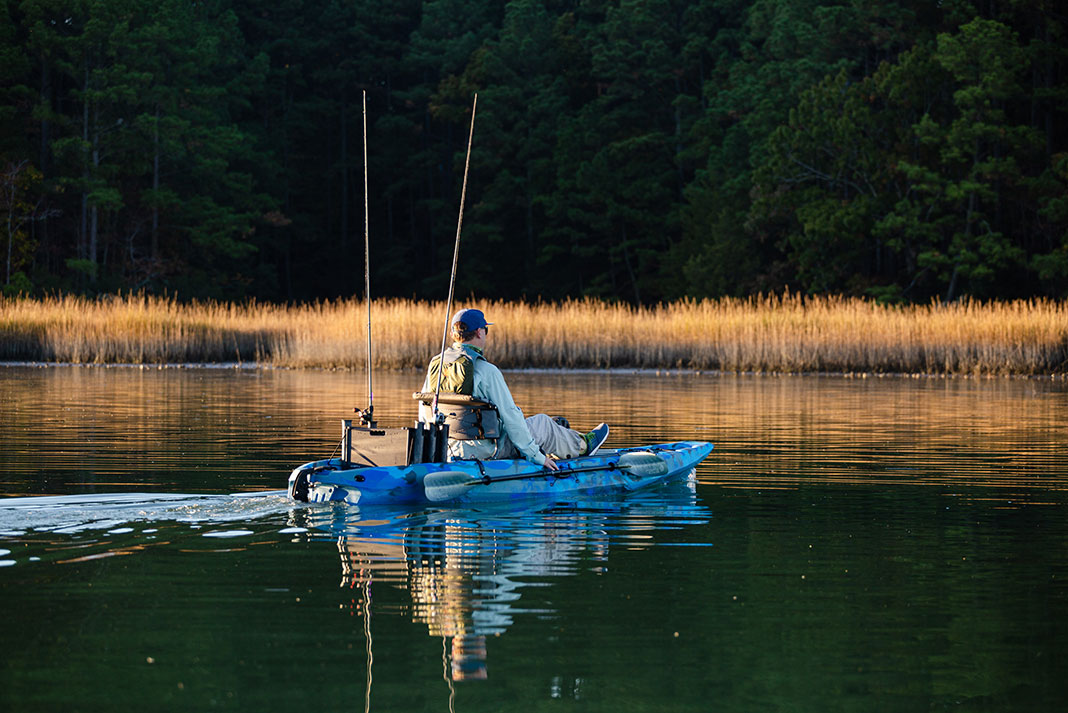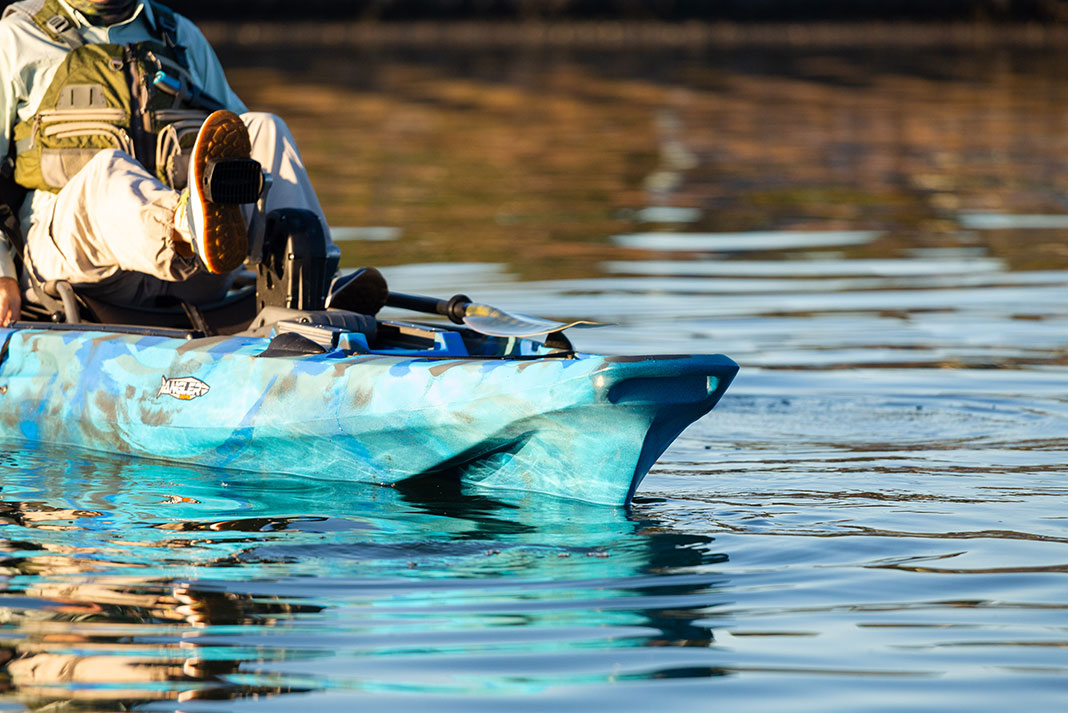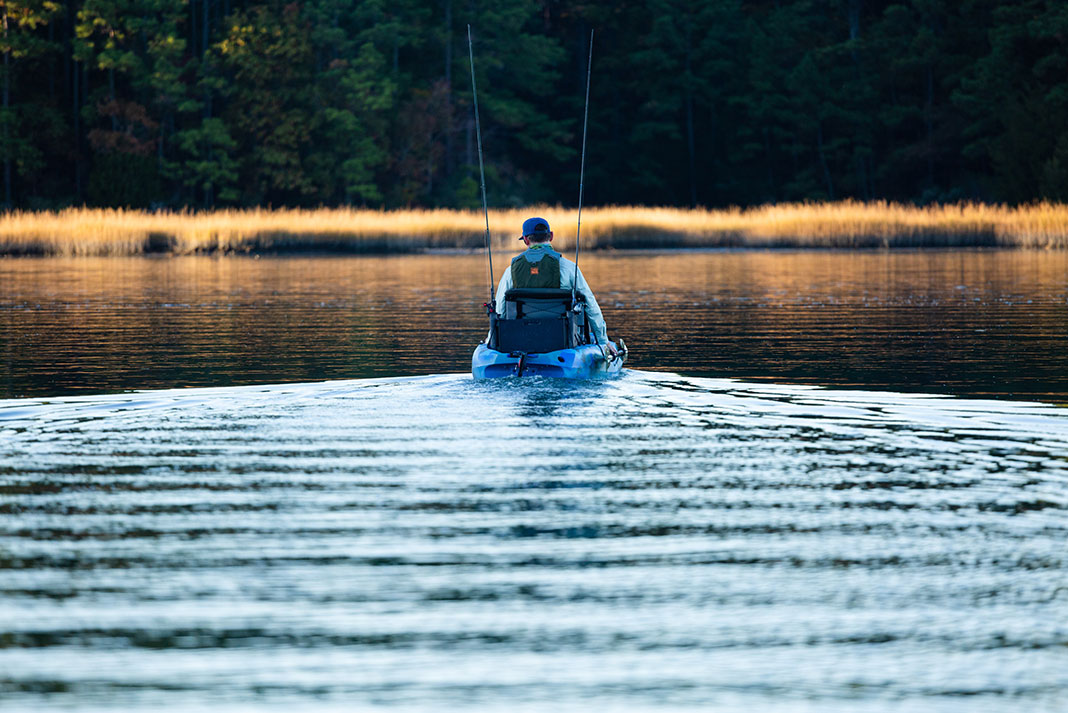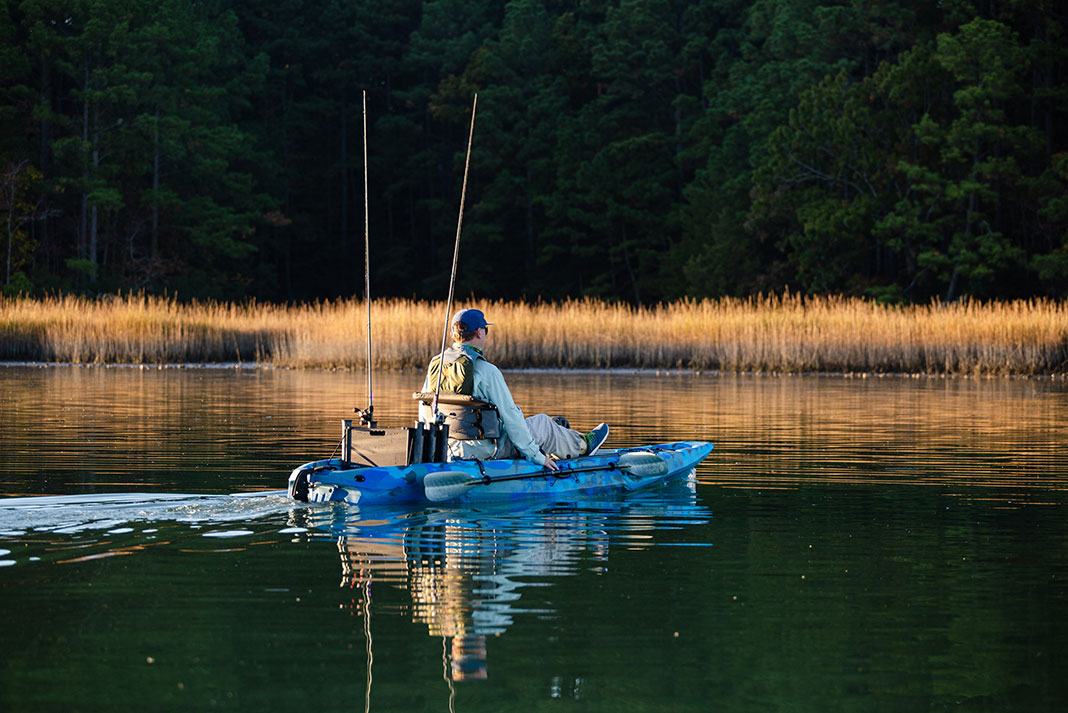Products You May Like
Confidently crossing a choppy bay, I’m heading to my favorite sheltered creek in a rigged-up pedal kayak. I have rod holders, frame seat, gear tracks and a powerful pedal drive taking me to the fish. What’s the big deal, you ask? I still have $1,000 in my bank account—the difference between the SeaStream Angler 120 PD I’m testing and what you would typically pay for an equally equipped pedal drive sit-on-top. In fact, the Angler 120 PD falls well below the $2,000 threshold that we thought no pedal kayak could beat just a few years ago.
Too many moving parts, they said. Not enough sales volume, they said. I say, I’m going fishing in the Angler 120 PD.
SeaStream Angler 120 Offers Pedal Power at Great Price
SeaStream Angler
120 PD SpecsLength: 12’3”
Width: 35”
Weight: 97 lbs
(Rapid Drive 22 lbs)Capacity: 400 lbs
MSRP: $1,699
seastreamkayaks.com
SeaStream is the sister company of long-time New Zealand sit-on-top kayak manufacturer Feelfree Kayaks. Feelfree made it easier to get from truck to the water with their innovative Wheel in the Keel, and created the first pedal drive and motor drive hybrid called the Overdrive. Feelfree also launched the Bass 100 microskiff under the Jonny Boats label and offers the Big Fish series of affordable kayaks badged 3 Waters Kayaks.
Since its inception in 2020, the SeaStream catalog has grown to include seven kayaks. Four make sense for anglers and borrow design and rigging features inspired by its big brother and sister brands.
The Angler 120 PD is positioned as a fishing kayak for beginners. It’s a funny category. Are beginner fishing kayaks for new kayakers or new anglers? Beginner kayaks are often thought to be inexpensive. So, do beginner kayakers have less money? This doesn’t make sense either; I know a few dentists getting into kayak fishing. I leave this conversation for the bait shop coffee counter. Discuss.
Key Fishy Features
The Angler 120 PD is two inches over 12 feet long and weighs 97 pounds without the pedal drive. So, I loaded it on my kayak trailer instead of wrestling it onto my roof racks. After adding the 22-pound drive and a day’s worth of fishing gear, a heavy-duty cart with large wheels is the best way to roll everything down to the launch.

The pontoon-style hull design and rudder system on the Angler 120 PD feel like the Feelfree Lure and Feelfree Moken, while the cockpit layout and seat base pull from the 3 Waters Kayaks brand.
The topside of the kayak features a molded storage area in the bow instead of a hatch. A large, deep tankwell in the stern has space for a standard gear crate or small cooler. A usual spider web of bungees will hold gear in place. The advantage to the well is it’s a convenient place to store gear and tackle you want to keep within easy reach.
The wide EZ-Rider frame seat features quick drying and breathable mesh on the bottom and back. It’s easy to adjust the angle on the water with ladder lock slider buckles. The seat moves forward and back on notches molded into the kayak, and a strap running through the seat base secures the seat to the boat. Simple and functional.
SeaStream Angler 120 Rigging
One of the most contentious discussions behind the scenes at any fishing kayak company, or automotive company for that matter, must be finding the balance of how much to include as standard features and at what price. Straight out of the box, this boat is ready to go fishing as soon as it hits the water.
Two flush mounted rod holders are installed behind the seat. The flush mount rod holders are angled straight back for trolling or bait fishing. I appreciated these flush mount rod holders as a quick place to stick the rod while rigging up or unhooking fish. Two horizontal rod holders with tip protectors run down each gunwale. Horizontal rod holders secured my rods to the deck as I sneaked below overhanging trees and low bridges.
Adding a gear crate to the tankwell gave me a place to carry more rods while underway and expanded storage to include a couple of tackle trays and a bag of gear. Feelfree UNI-Track accessory rails run either side of the cockpit ahead of the seat.
Maybe what makes the SeaStream Angler 120 PD a beginner fishing kayak is the lack of through-hull scuppers and routing for wires and batteries to run electronics, motor or power anchor systems. And that’s okay. Not including these niceties allows SeaStream to keep the kayak simple and the price down. And it doesn’t mean you can’t drill, thread and epoxy them in later, of course.

The Rapid Pedal Drive
The heart of the SeaStream Angler 120 PD is the Rapid Pedal Drive pedal system.
The drive uses bicycle crank arms to turn a chain spinning the propeller below. Forward and backward. The internal mechanisms are sealed from water and dirt. The prop and crank arms are easily tightened. Remove a bolt to grease the chain and bottom end. If the chain feels sloppy, it can be adjusted via an external hex bolt without having to crack the unit apart.
The Rapid Pedal Drive is easy to install into the Angler 120. The pedal unit slides smoothly into a metal track and clips to the deck with a simple latch. When in place, the system fills the pedal scupper, blocking water and noise. It’s a solid connection to the hull to transfer as much pedal power to turn the propeller.
To enter shallow water or land the kayak follow these steps: Push down the blue prop catch knob on the drive; turn the pedals until the propeller hits the catch; flip the latch holding the pedal drive into the deck and lift the lower unit. To keep the pedal system elevated, turn the propeller perpendicular to the drive opening and further secure it for transport with a little bungee cord. Sounds complicated? It’s not.
The Rapid Pedal Drive is larger and heavier than many other pedal systems. But the Angler 120 PD package is also $1,000 less expensive than some other pedal kayaks. It’s heavy to lug around but, on the water, it’s an easy-to-operate pedal system pushing the Angler 120 PD smoothly and efficiently.

On Water Performance
The Angler 120 PD’s strongest point is its stability. The SeaStream’s catamaran hull pushes volume to the outside edges. As a result, the SeaStream stays rock solid for confident paddling and pedaling, whether you’re a beginner or not. I bet you’ll stand and cast with barely a wobble.
The large Beaver Tail rudder complements the Rapid Drive Pedal system and catamaran hull and performs the heavy work of turning the Angler 120 PD. The large rudder is controlled by sturdy stainless steel cables and a long tiller arm left of the seat. The rudder goes up and down with a rope and cleat system located on the right side of the seat. Simple, reliable and effective handling. The rudder allows it to turn on a dime at any speed.
I’ve tested plenty of bargain pedal kayaks. Most brands try to cut corners with wiggly rudder controls, flimsy seats and creaky pedal systems. Beginners don’t want this. Nobody does.
SeaStream’s rich lineage allows the Angler 120 PD to take advantage of all the research and development, design experience, and quality of its predecessors to build a pedal drive fishing kayak at a once-unimaginable price.
Is the Angler 120 PD still too dear for your first kayak? It’s also available in a paddle-only version, the Angler 120, for half the price. That means you can either have the pedal drive or a second boat. Do you know what’s just as great as an efficient pedal system when learning to kayak fish and crossing a choppy bay to a new favorite sheltered creek? A buddy.
Pros and cons
Pros
- Less expensive than most pedal kayaks
- Stable
- Solid construction
- Comfortable seat
Cons
- Heavy
- Drilling to rig with electronics
- No hatch
Related articles
Sit-on-top fishing kayak reviews
Pedal fishing kayak reviews
This article was first published in the Early Summer 2022 issue of Kayak Angler Magazine. Subscribe to Kayak Angler Magazine’s print and digital editions, or browse the archives.
Budget doesn’t mean cheap. Smart design and sturdy construction for less than $2,000. | Feature photo: Roberto Westbrook
